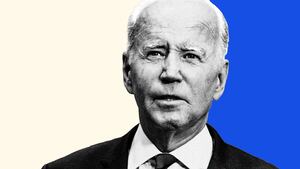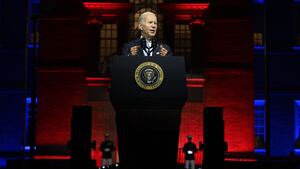Just five weeks out from the 2022 midterms, Democrats are redoubling their efforts to make abortion the defining issue of the election. The only problem? It isn’t.
Don’t get me wrong, abortion is an important issue for many voters. But the economy and inflation are the dominant issues—and have been for months. This is broadly true. Among Hispanics, for example, only 5 percent ranked abortion as their most important issue according to NBC News/Telemundo survey.
Still, Dems are betting the House on the issue. “Abortion has been the most popular issue in Democratic broadcast TV spots,” Politico reports, “appearing in nearly one-third of them, according to AdImpact data.” The obvious question is… why?
Desperation makes the most sense. Republicans hold a huge advantage on inflation and the economy (not to mention crime). It seems unlikely anything can be done to change that, so Democrats are trying to change the subject to an issue where they can win.
“There is a campaign about the economy, cost of living, crime, and border security, and Republicans are winning this campaign,” GOP pollster Bill McInturff told NBC News. “But there is a second campaign on abortion, democracy and climate change, and Democrats are winning that campaign.”
Reality check time: The second campaign ranks far below the first campaign, in terms of how voters prioritize the issues.
This is a fundamental problem for Dems who were already trying to defy historical trends that favor the party that is out of power.
Think of it like this. The political environment says that the election is about the economy and inflation. Therefore, if you are talking about those issues, you are swimming with the tide. Conversely, if you are attempting to make something else the most important issue, you are swimming against the tide. Now, every once in a while, you can turn the tide. More often, though, you drown.
The other hope for Democrats is to change the electorate (if you can’t change the voters’ priorities, change voters). In other words, turn out more young voters who prioritize abortion rights than the so-called experts predicted.
Now, consider the difficulty involved in pulling this trick off: Young adults are much more likely to be pro-choice, but young people don’t tend to vote.
Talk about swimming against the tide.
Would I be surprised if the pollsters ended up with egg on their faces again? No. But polling errors are the last refuge of losers.
Of course, it’s possible that Dobbs has changed everything we think we know about politics and that all the old rules are out the window. Republican strategist Mike Murphy calls the 2022 midterms a test of the “historical normalcy” model versus the “this time, it’s different!” theory.
Anyone who has been around politics for a long time knows that sometimes things really are different—but that’s not where you put the smart money.
This is not a criticism; it very well may be that doubling down on abortion, knowing the goal is simply to mitigate your losses, is the wisest strategy Democrats could pursue. Sometimes losing by less is the best you can hope for. The thing is, you can never cop to this. If your goal is to motivate your base, you have to pretend you’re going to win, or else defeatism becomes a self-fulfilling prophecy.
The point is, in certain states or districts, focusing on abortion probably is not only the right move, but the winning move. And when you consider that the fate of the U.S. Senate could hinge on one race, any small advantage could make a huge difference.
Let’s take Wisconsin, where Democratic Lt. Gov. Mandela Barnes has chosen to make abortion the first direct negative ad he is running against Republican Sen. Ron Johnson this cycle. He has also launched something called a “Ron Against Roe” tour. After starting off strong, Barnes has lost footing amid being hammered for being soft on crime. Polling shows that a majority of people in Wisconsin support abortion rights, so if nothing else, Barnes benefits from changing the subject.
At the House level, this strategy might help Dems mitigate their losses—by losing fewer House seats.
But will the issue of abortion resonate as much with the electorate as Democrats running campaigns believe?
As we enter October, Democrats are desperately trying to make “fetch” happen—but their backs are against the wall. To paraphrase Donald Rumsfeld, you don’t go to war with the political issues you want, you go to war with the political issues you have.
For Democrats, it all rests on abortion.









